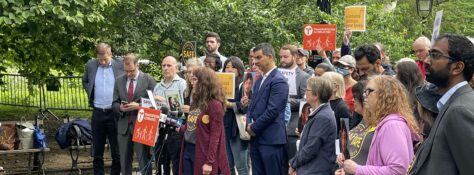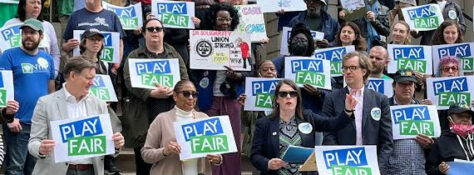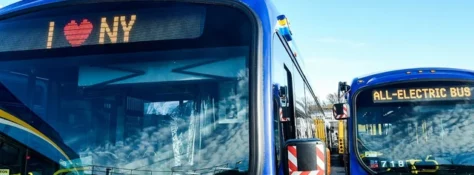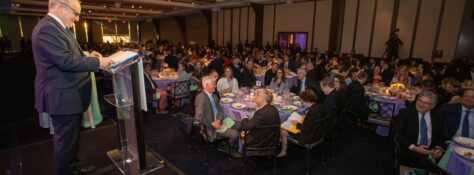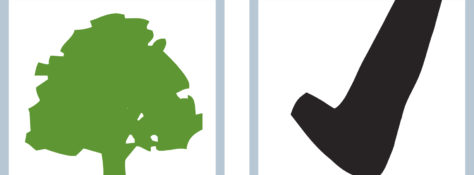The New York Legislature wrapped up its 2022 legislative session on the weekend of June 3rd, leaving Albany for the year after passing several important bills that were part of the NYLCV’s 2022 State Policy Agenda.
Learn MoreNews
It’s rare to see borough presidents working together, but there is one initiative that all five can get behind– trees. In February, Manhattan Borough President Mark Levine introduced a new project alongside Vanessa Gibson of the Bronx, Antonio Reynoso of Brooklyn, Donovan Richards of Queens, and Vito Fossella of Staten Island. They are calling on Mayor Adams to plant one million new trees by 2030.
Learn MoreNine days after the joint press rally between the NY League of Conservation Voters, Riders Alliance, and Transportation Alternatives, the City Council, Senate and Assembly have passed a bill to expand the operating time on city speed cameras to include nights and weekends for three years. This news comes on the heels of the “potential fourth straight year of increasing traffic fatalities in NYC- a first since 1990,” showing we need enhanced pedestrian safety measures now more than ever. At the rally more than thirty people stood up for the principle that New York City should be able to control how it deploys traffic cameras on its streets. Many attendees held signs and pictures of loved ones lost to traffic violence and shared heartbreaking stories of loss and grief caused by reckless driving. Speakers included state legislators, New York City Council members, DOT Commissioner Ydanis Rodriguez, and street safety advocates, all of whom criticized, pushed, and rallied in support of the bill.
Learn MoreParks are one of the City’s most valuable assets and we must be investing in them in order to fight climate change, protect public health, and bolster the safety and wellbeing of our communities. Parks provide numerous resiliency benefits, increasing cooling by reducing the urban heat island effect and fighting flooding through capturing stormwater runoff. Parks also clean our air, and absorb climate-change causing pollutants and greenhouse gasses. Lastly parks provide safe open spaces for recreation, an aspect highlighted during the height of the pandemic. To ensure parks can continue to provide these benefits, we must be investing heavily in parks operations and maintenance.
Learn MoreEach passing day is a struggle against the clock in the fight against climate change, with continuous emissions increasing the already-heavy strain on the ozone layer. According to the Environmental Protection Agency (EPA), in 2020, transportation made up 27% of the total United States greenhouse gas (GHG) emissions, taking the lead over electricity and industry, and contributing to already-dangerous rising temperatures by putting out carbon dioxide emissions from petroleum-based fuel options. The Clean Fuels NY Coalition, led by the New York League of Conservation Voters, was formed to showcase the widespread support for New York State to create a clean fuel standard (also known as a low-carbon fuel standard) and reduce GHG emissions from the transportation sector, which accounts for 35% of overall state emissions.
Learn MoreThe New York City bus system is the largest in the nation, but also the slowest and most inefficient. An MTA bus has an average speed of 7.9mph, and spends 43% of its travel time sitting at traffic lights or bus stops. Outdated infrastructure and technology leads to constant delays and unpredictability that inconveniences those who rely on it every single day. Our bus system is in dire need of updates, especially as ridership bounces back to pre-pandemic levels. We must invest in making our buses faster and more efficient to ensure all members of our community can rely on them each and every day.
Learn MoreEvery year NYLCV and NYLCVEF celebrate the environmental progress we’ve helped create in New York City and across the State with our annual gala. This year we surpassed our fundraising goal for a total of $1.2 million, which will be used to support the work we do over the next year. Over 700 people including legislators, environmental champions, and industry leaders joined us to celebrate.
Learn MoreNews
New York voters turned out on Election Day to deliver a resounding victory for the environment! Voters approved Proposition 1, the $4.2 billion Environmental Bond Act, and elected environmental champions up and down the ballot.
Learn More
